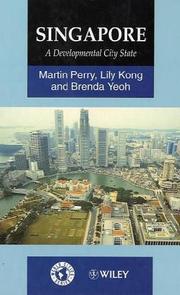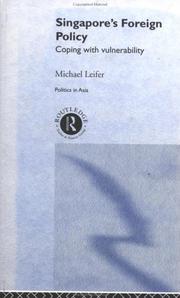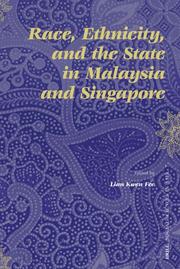| Listing 1 - 10 of 91 | << page >> |
Sort by
|
Book
ISBN: 9888313266 9789888313266 9888208756 9789888208753 9888208764 9789888208760 Year: 2015 Publisher: Hong Kong
Abstract | Keywords | Export | Availability | Bookmark
 Loading...
Loading...Choose an application
- Reference Manager
- EndNote
- RefWorks (Direct export to RefWorks)
Bugis Street was famous (or notorious) for being a haunt of transgender prostitution in the early decades of postcolonial Singapore. Since then the site has been a source of touristic obsession and local cultural anxiety. In his 1995 film Bugis Street, director Yonfan brings the short lane back to vivid cinematic life. By focusing on the film's representations of queer sexualities and transgender experience, this book contends that the under-appreciated Bugis Street is a significant instance of queer transnational cinema. The film's playful yet nuanced articulations of queer embodiment, spatiality, and temporality provide an unexpected intervention in the public discourses on LGBT politics, activism, and cultures in Singapore today. This book's arrival at a much more complicated and contradictory picture of the discursive Bugis Street, through the examination of Yonfan's film and a range of other cultural and literary texts, adds a new critical dimension to the ongoing historical, geographical, sociological, ethnographic, and artistic analyses of this controversial space.
Prostitution in motion pictures. --- Transsexuals in motion pictures. --- Motion pictures --- Yang, Fan, --- Criticism and interpretation. --- Bugis Street (Motion picture) --- History and criticism. --- Bugis Street (Singapore) --- Singapore --- Ciṅkappūr --- Colony of Singapore --- Garden City --- Hsin-chia-pʻo --- Lion City --- Red Dot --- Republic of Singapore --- Republik Singapura --- Singapore City (Singapore) --- Singapore Colony --- Singapore (Singapore) --- Singapour --- Singapur --- Singapura --- Singkhapō --- Tumasik (Singapore) --- Xinjiapo --- Xinjiapo gong he guo --- Xinjiapo Gongheguo --- 新加坡 --- 新加坡共和国 --- Syonan-to --- History. --- In motion pictures. --- History and criticism
Book

ISBN: 928321191X Year: 1988 Volume: vol 91
Abstract | Keywords | Export | Availability | Bookmark
 Loading...
Loading...Choose an application
- Reference Manager
- EndNote
- RefWorks (Direct export to RefWorks)
Neoplasms --- epidemiology. --- Singapore. --- Singapore --- Statistics, Medical. --- Cancer --- Cancers --- Carcinoma --- Malignancy (Cancer) --- Malignant tumors --- Tumors --- Statistics --- epidemiology --- Ciṅkappūr --- Colony of Singapore --- Garden City --- Hsin-chia-pʻo --- Lion City --- Red Dot --- Republic of Singapore --- Republik Singapura --- Singapore City (Singapore) --- Singapore Colony --- Singapore (Singapore) --- Singapour --- Singapur --- Singapura --- Singkhapō --- Tumasik (Singapore) --- Xinjiapo --- Xinjiapo gong he guo --- Xinjiapo Gongheguo --- 新加坡 --- 新加坡共和国 --- Syonan-to --- Singapoer --- سنغافورة --- Sanghāfūrah --- Singhāfūrah --- Sinqapur --- Sin-ka-pho --- Сінгапур --- Sinhapur --- Сингапур --- Singgapura --- Σιγκαπούρη --- Sinkapoyrē --- Singapuro --- Singapul --- Sinngapuur --- Singeapór --- 싱가포르 --- Singgap'orŭ --- Singafora --- Sinapoa --- סינגפור --- Singapuri --- Sengapou --- Singapūras --- Singapūro Respublika --- Scingapô --- Szingapúr --- Singaporo --- Hingapoa --- シンガポール --- Shingapōru

ISBN: 0471971901 Year: 1997 Publisher: Chichester : Wiley,
Abstract | Keywords | Export | Availability | Bookmark
 Loading...
Loading...Choose an application
- Reference Manager
- EndNote
- RefWorks (Direct export to RefWorks)
Singapore --- Singapore. --- Singapura --- Singkhapō --- Singapur --- Singapour --- Hsin-chia-pʻo --- Ciṅkappūr --- Republic of Singapore --- Lion City --- Garden City --- Red Dot --- Republik Singapura --- 新加坡共和国 --- Xinjiapo Gongheguo --- Xinjiapo gong he guo --- 新加坡 --- Xinjiapo --- Singapore (Singapore) --- Singapore City (Singapore) --- Tumasik (Singapore) --- Singapore Colony --- Colony of Singapore --- Syonan-to --- Singapoer --- سنغافورة --- Sanghāfūrah --- Singhāfūrah --- Sinqapur --- Sin-ka-pho --- Сінгапур --- Sinhapur --- Сингапур --- Singgapura --- Σιγκαπούρη --- Sinkapoyrē --- Singapuro --- Singapul --- Sinngapuur --- Singeapór --- 싱가포르 --- Singgap'orŭ --- Singafora --- Sinapoa --- סינגפור --- Singapuri --- Sengapou --- Singapūras --- Singapūro Respublika --- Scingapô --- Szingapúr --- Singaporo --- Hingapoa --- シンガポール --- Shingapōru
Book
ISBN: 9781783263776 1783263776 9781783263974 1783263970 1783263784 9781783263783 Year: 2013 Publisher: London Singapore
Abstract | Keywords | Export | Availability | Bookmark
 Loading...
Loading...Choose an application
- Reference Manager
- EndNote
- RefWorks (Direct export to RefWorks)
Former Head of the Singapore Civil Service Mr Lim Siong Guan now shares his diverse experiences and fresh insights on leadership in his exclusive new book, The Leader, The Teacher & You . As a former Permanent Secretary in ministries, including the Ministry of Defence, the Prime Minister's Office and the Ministry of Finance, and former chairman of the Inland Revenue Authority of Singapore and the Singapore Economic Development Board, the indefatigable public servant has contributed greatly to Singapore's success, introducing innovative policies and practices at each turn, which have greatly en
Leadership. --- Singapore --- Officials and employees --- Lim, Siong Guan. --- Singapura --- Singkhapō --- Singapur --- Singapour --- Hsin-chia-pʻo --- Ciṅkappūr --- Republic of Singapore --- Lion City --- Garden City --- Red Dot --- Republik Singapura --- 新加坡共和国 --- Xinjiapo Gongheguo --- Xinjiapo gong he guo --- 新加坡 --- Xinjiapo --- Singapore (Singapore) --- Singapore City (Singapore) --- Tumasik (Singapore) --- Singapore Colony --- Colony of Singapore --- Ability --- Command of troops --- Followership --- Syonan-to --- Leadership --- E-books --- Singapoer --- سنغافورة --- Sanghāfūrah --- Singhāfūrah --- Sinqapur --- Sin-ka-pho --- Сінгапур --- Sinhapur --- Сингапур --- Singgapura --- Σιγκαπούρη --- Sinkapoyrē --- Singapuro --- Singapul --- Sinngapuur --- Singeapór --- 싱가포르 --- Singgap'orŭ --- Singafora --- Sinapoa --- סינגפור --- Singapuri --- Sengapou --- Singapūras --- Singapūro Respublika --- Scingapô --- Szingapúr --- Singaporo --- Hingapoa --- シンガポール --- Shingapōru
Book
ISBN: 1137582588 113758257X Year: 2017 Publisher: London : Palgrave Macmillan UK : Imprint: Palgrave Macmillan,
Abstract | Keywords | Export | Availability | Bookmark
 Loading...
Loading...Choose an application
- Reference Manager
- EndNote
- RefWorks (Direct export to RefWorks)
This book explores the personal experiences of professionals who are a part of the post-colonial and late-industrializing reality in the global value chain in Singapore. Looking at Chinese Singaporean employees at a French multi-national firm, the author explores the evolving social constructions of ‘Chineseness’. Sociologist Manuel Castells once hailed Singapore as ‘the only true Leninist project that has survived’, and Lee revisits the Singapore ‘social laboratory’, addressing recent dialectics that transpire within the global political economy. Currently, professional actors need to address the demands of dual hegemony in response to China’s rise in the Western-dominated capitalist political economy. Underlying these constructions are enduring dispositions that mediate interpretations of professionalism. The author puts to test the potential for change, surveying a large cohort of teachers as makers of future professionals. The question is, does change occur in the domain of practice or the habitus, if it is possible in the first place? The book will be of interest to scholars and students with an interest in Sociology, Identity and Ethnicity, Business Management, Globalisation, Organizational Sociology and Sociology of Education. .
Political science. --- Globalization. --- Markets. --- Industrial sociology. --- Political Science and International Relations. --- Sociology of Work. --- Emerging Markets/Globalization. --- Singapore --- Economic policy. --- Singapura --- Singkhapō --- Singapur --- Singapour --- Hsin-chia-pʻo --- Ciṅkappūr --- Republic of Singapore --- Lion City --- Garden City --- Red Dot --- Republik Singapura --- 新加坡共和国 --- Xinjiapo Gongheguo --- Xinjiapo gong he guo --- 新加坡 --- Xinjiapo --- Singapore (Singapore) --- Singapore City (Singapore) --- Tumasik (Singapore) --- Singapore Colony --- Colony of Singapore --- Syonan-to --- Sociology --- Industrial organization --- Industries --- Global cities --- Globalisation --- Internationalization --- International relations --- Anti-globalization movement --- Social aspects --- Public markets --- Commerce --- Fairs --- Market towns --- Majulah Singapura --- State of Singapore --- Crown Colony of Singapore --- Singapure --- Colonie de Singapore
Book
ISBN: 9814366013 9814366005 9789814366014 9789814366007 Year: 2012 Publisher: Singapore Hackensack, N.J. World Scientific
Abstract | Keywords | Export | Availability | Bookmark
 Loading...
Loading...Choose an application
- Reference Manager
- EndNote
- RefWorks (Direct export to RefWorks)
"This book aims to demonstrate how successful policies in Singapore have integrated conventional economic principles with insights from the emerging field of behavioural economics even before the latter became popular. Using examples from various policy domains, it shows how good policy design often requires a synthesis of insights from economics and psychology. Policies should not only be compatible with economic incentives, but should also be sensitive to the cognitive abilities, limitations and biases of citizens. Written by policy practitioners in the Singapore government, this book is an introduction to how behavioural economics and the findings from cognitive psychology can be intelligently applied to the design of public policies."--Publisher's description.
Economics --- Psychological aspects --- Singapore --- Economic policy --- Economic theory --- Political economy --- Singapura --- Singkhapō --- Singapur --- Singapour --- Hsin-chia-pʻo --- Ciṅkappūr --- Republic of Singapore --- Lion City --- Garden City --- Red Dot --- Republik Singapura --- 新加坡共和国 --- Xinjiapo Gongheguo --- Xinjiapo gong he guo --- 新加坡 --- Xinjiapo --- Singapore (Singapore) --- Singapore City (Singapore) --- Tumasik (Singapore) --- Singapore Colony --- Colony of Singapore --- Social sciences --- Economic man --- Syonan-to --- E-books --- Singapoer --- سنغافورة --- Sanghāfūrah --- Singhāfūrah --- Sinqapur --- Sin-ka-pho --- Сінгапур --- Sinhapur --- Сингапур --- Singgapura --- Σιγκαπούρη --- Sinkapoyrē --- Singapuro --- Singapul --- Sinngapuur --- Singeapór --- 싱가포르 --- Singgap'orŭ --- Singafora --- Sinapoa --- סינגפור --- Singapuri --- Sengapou --- Singapūras --- Singapūro Respublika --- Scingapô --- Szingapúr --- Singaporo --- Hingapoa --- シンガポール --- Shingapōru
Book
ISBN: 9812815589 9812815570 9789812815583 9789812815576 Year: 2009 Publisher: Hackensack, NJ World Scientific
Abstract | Keywords | Export | Availability | Bookmark
 Loading...
Loading...Choose an application
- Reference Manager
- EndNote
- RefWorks (Direct export to RefWorks)
This book is a spin-off from a highly successful seminar series jointly organized by the Division of Economics of the Nanyang Technological University (NTU) and the Ministry of Education (MOE) of Singapore. The seminars discuss contemporary domestic and regional economic issues and public policies that are relevant to the everyday lives of Singaporeans. The wish to introduce these economic issues to a broader audience outside the confinement of a lecture theatre, came to fruition, with the completion of this book.This book contains 13 chapters that are grouped under three sections. Under the s
Globalization --- Economic aspects --- Asia --- Singapore --- Economic policy --- Global cities --- Globalisation --- Internationalization --- Singapura --- Singkhapō --- Singapur --- Singapour --- Hsin-chia-pʻo --- Ciṅkappūr --- Republic of Singapore --- Lion City --- Garden City --- Red Dot --- Republik Singapura --- 新加坡共和国 --- Xinjiapo Gongheguo --- Xinjiapo gong he guo --- 新加坡 --- Xinjiapo --- Singapore (Singapore) --- Singapore City (Singapore) --- Tumasik (Singapore) --- Singapore Colony --- Colony of Singapore --- International relations --- Anti-globalization movement --- Syonan-to --- E-books --- Singapoer --- سنغافورة --- Sanghāfūrah --- Singhāfūrah --- Sinqapur --- Sin-ka-pho --- Сінгапур --- Sinhapur --- Сингапур --- Singgapura --- Σιγκαπούρη --- Sinkapoyrē --- Singapuro --- Singapul --- Sinngapuur --- Singeapór --- 싱가포르 --- Singgap'orŭ --- Singafora --- Sinapoa --- סינגפור --- Singapuri --- Sengapou --- Singapūras --- Singapūro Respublika --- Scingapô --- Szingapúr --- Singaporo --- Hingapoa --- シンガポール --- Shingapōru --- International economic relations

ISBN: 1134569491 0203129512 1280329173 0203171470 9786610329175 9780203171479 9780203129517 9780415233521 0415233526 9780415233538 0415233534 6610329176 9781134569496 9781280329173 9781134569441 9781134569489 1134569483 Year: 2000 Publisher: New York, N.Y. Routledge
Abstract | Keywords | Export | Availability | Bookmark
 Loading...
Loading...Choose an application
- Reference Manager
- EndNote
- RefWorks (Direct export to RefWorks)
In the years following its traumatic separation from Malaysia, Singapore has risen to become one of the leading economic powers in Southeast Asia. This economic strength has carried it through the recent East Asian economic crisis, as well as providing the resources for an excellent defense capability. Singapore's diplomatic achievements include relationships with countries across Asia and Europe, and ensure its interantional status, Yet, despite this success, Singapore's foreign policy has continued to be influenced by a deep seated sense of its own vulnerability. Politicians from the first p
Singapore --- Ciṅkappūr --- Colony of Singapore --- Garden City --- Hsin-chia-pʻo --- Lion City --- Red Dot --- Republic of Singapore --- Republik Singapura --- Singapore City (Singapore) --- Singapore Colony --- Singapore (Singapore) --- Singapour --- Singapur --- Singapura --- Singkhapō --- Tumasik (Singapore) --- Xinjiapo --- Xinjiapo gong he guo --- Xinjiapo Gongheguo --- 新加坡 --- 新加坡共和国 --- Syonan-to --- Foreign relations. --- Singapoer --- سنغافورة --- Sanghāfūrah --- Singhāfūrah --- Sinqapur --- Sin-ka-pho --- Сінгапур --- Sinhapur --- Сингапур --- Singgapura --- Σιγκαπούρη --- Sinkapoyrē --- Singapuro --- Singapul --- Sinngapuur --- Singeapór --- 싱가포르 --- Singgap'orŭ --- Singafora --- Sinapoa --- סינגפור --- Singapuri --- Sengapou --- Singapūras --- Singapūro Respublika --- Scingapô --- Szingapúr --- Singaporo --- Hingapoa --- シンガポール --- Shingapōru

ISBN: 1281398691 9786611398699 9047409469 9789047409465 900415096X 9789004150966 900415096X 9789004150966 9789047409465 9781281398697 6611398694 Year: 2006 Publisher: Leiden Boston Brill
Abstract | Keywords | Export | Availability | Bookmark
 Loading...
Loading...Choose an application
- Reference Manager
- EndNote
- RefWorks (Direct export to RefWorks)
This publication brings together the work of several writers in documenting and understanding the consequences of state-formation on ethnicity in Malaysia and Singapore, thirty years after the two nations went their separate paths.
Ethnicity --- Ethnic identity --- Group identity --- Cultural fusion --- Multiculturalism --- Cultural pluralism --- Malaysia --- Singapore --- Ciṅkappūr --- Colony of Singapore --- Garden City --- Hsin-chia-pʻo --- Lion City --- Red Dot --- Republic of Singapore --- Republik Singapura --- Singapore City (Singapore) --- Singapore Colony --- Singapore (Singapore) --- Singapour --- Singapur --- Singapura --- Singkhapō --- Tumasik (Singapore) --- Xinjiapo --- Xinjiapo gong he guo --- Xinjiapo Gongheguo --- 新加坡 --- 新加坡共和国 --- Syonan-to --- Ethnic relations. --- Race relations. --- Singapoer --- سنغافورة --- Sanghāfūrah --- Singhāfūrah --- Sinqapur --- Sin-ka-pho --- Сінгапур --- Sinhapur --- Сингапур --- Singgapura --- Σιγκαπούρη --- Sinkapoyrē --- Singapuro --- Singapul --- Sinngapuur --- Singeapór --- 싱가포르 --- Singgap'orŭ --- Singafora --- Sinapoa --- סינגפור --- Singapuri --- Sengapou --- Singapūras --- Singapūro Respublika --- Scingapô --- Szingapúr --- Singaporo --- Hingapoa --- シンガポール --- Shingapōru
Book
ISBN: 9048523427 9789048523429 9789089646651 9089646655 Year: 2014 Publisher: Amsterdam
Abstract | Keywords | Export | Availability | Bookmark
 Loading...
Loading...Choose an application
- Reference Manager
- EndNote
- RefWorks (Direct export to RefWorks)
This study traces the socio-political effects of immigration on Singapore and its population, a topic that has been the subject of intense debate in the nation as its population grows increasingly diverse. Beyond the logic of economic imperatives, the book aims to explore the larger consequences of taking in large number of immigrants, and its analysis should appeal to scholars of migration, social change, and public policy.
Immigrants --- Emigrants --- Foreign-born population --- Foreign population --- Foreigners --- Migrants --- Persons --- Aliens --- Singapore --- Social life and customs. --- Manners and customs. --- Immigrants. --- SOCIAL SCIENCE --- Behavioral sciences --- Human sciences --- Sciences, Social --- Social science --- Social studies --- Civilization --- Ceremonies --- Customs, Social --- Folkways --- Social customs --- Social life and customs --- Traditions --- Usages --- Ethnology --- Etiquette --- Rites and ceremonies --- General. --- Emigration & Immigration. --- Singapore. --- Ciṅkappūr --- Colony of Singapore --- Garden City --- Hsin-chia-pʻo --- Lion City --- Red Dot --- Republic of Singapore --- Republik Singapura --- Singapore City (Singapore) --- Singapore Colony --- Singapore (Singapore) --- Singapour --- Singapur --- Singapura --- Singkhapō --- Tumasik (Singapore) --- Xinjiapo --- Xinjiapo gong he guo --- Xinjiapo Gongheguo --- 新加坡 --- 新加坡共和国 --- Syonan-to
| Listing 1 - 10 of 91 | << page >> |
Sort by
|

 Search
Search Feedback
Feedback About UniCat
About UniCat  Help
Help News
News